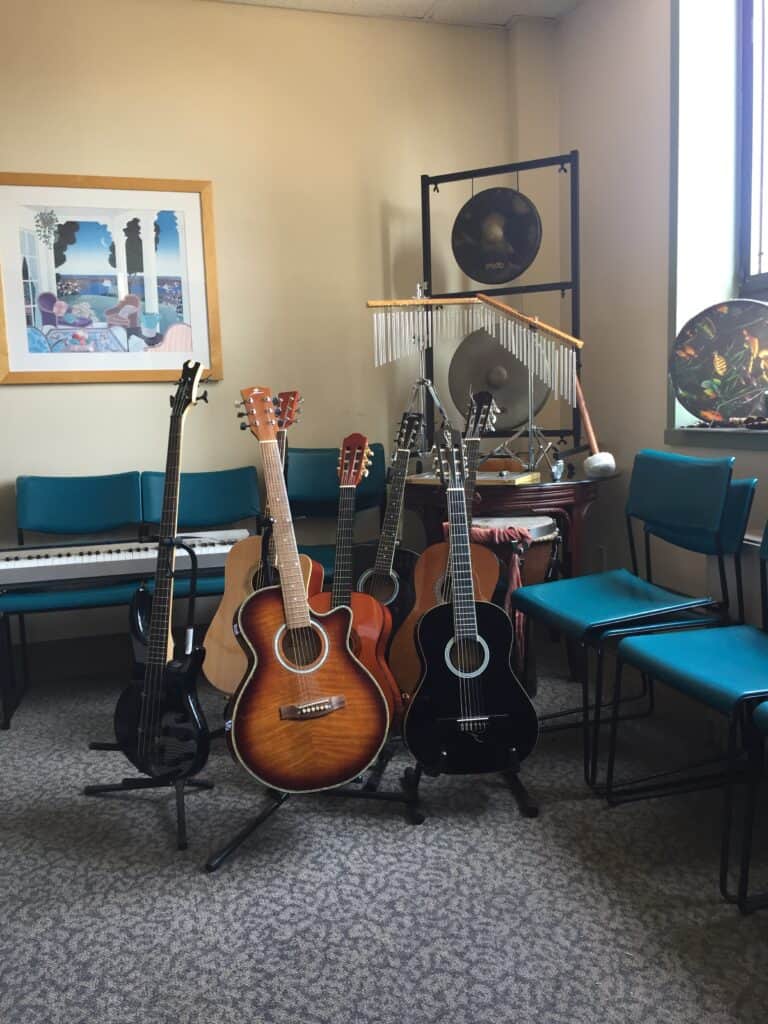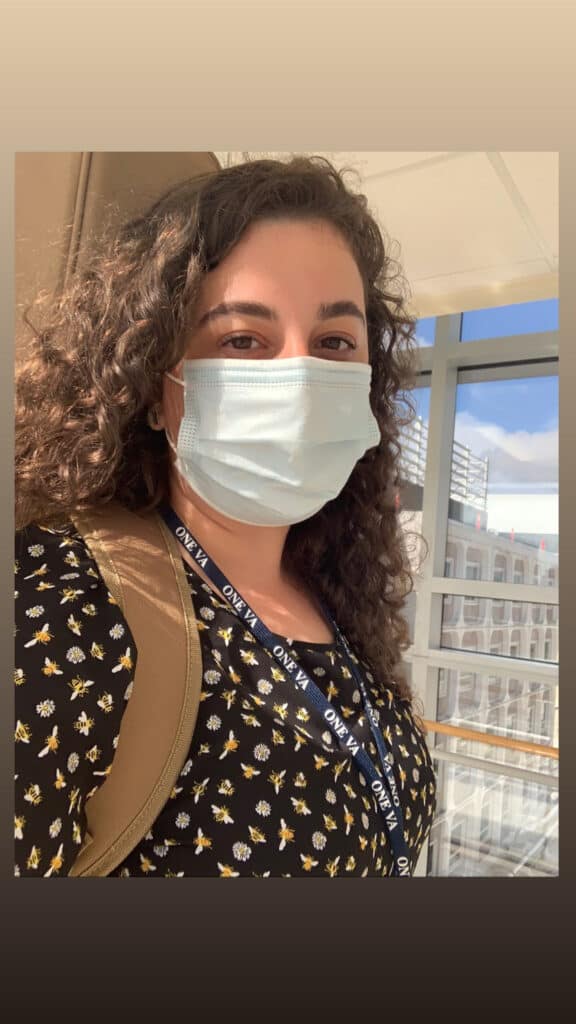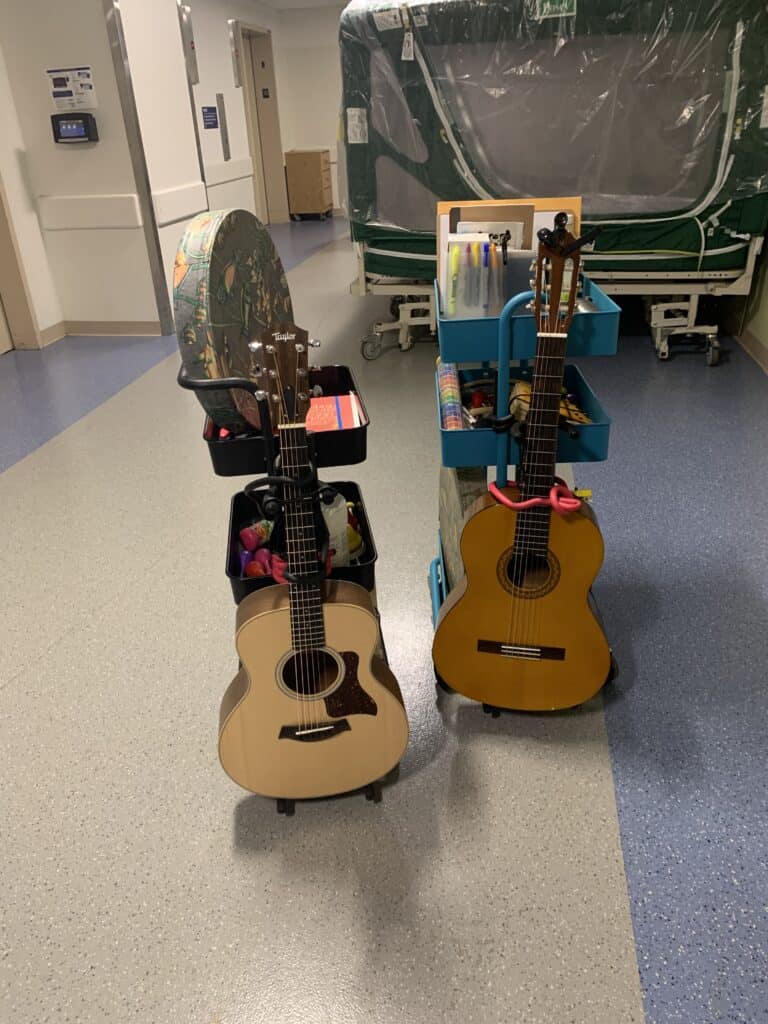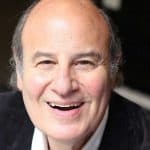by Jim DeStefano
Introducing Music Therapy to masses: And interview with Tatiana Penagos MA, MT-BC:
This month we here at Inside Music Schools have a rare treat for the prospective music student readying themselves for the next phase of their music education. We sat down with Tatiana Penagos MA, MT-BC, a Music Therapist who was happy to share stories about her passion, her career, and the role music has played in shaping both her professional and personal life. We are appreciative of her efforts in educating our students about a potential career in the field of music.

What’s your name?
My name is Tatiana Penagos MA, MT-BC
Where do you work?
I currently work with the Veteran’s Health Administration at the North Florida/South Georgia Veteran’s Medical Center in Gainesville, FL. As a Board-Certified Music Therapist, I work with Veterans that have a variety of mental and physical illnesses. I mostly work with Veterans who have Traumatic Brain Injuries, PTSD, have been diagnosed with cancers from environmental exposures during deployments, or other chronic mental health and physical health issues. Previously, I worked at Boston Children’s Hospital in Boston, MA and was a Research Fellow with the Mount Sinai Healthcare System in New York City.
Where did you attend school?
I received my bachelor’s degree from THE Florida State University in 2015. I then went on to complete my master’s degree at New York University in 2019.
What music degree or degrees did you pursue?
I have a Bachelor of Music in Music Therapy from the College of Music at Florida State University.
When I finished my Bachelor of Music in Music Therapy, I had a job that I felt was not exactly the right fit for me and I explored other fields like Social Work or being a Physician’s Assistant. After I finally passed my board certification (took me 3 tries!) I decided that Music Therapy was my passion and I wanted to continue learning and growing in the field I had been studying for 4 years, so I applied to NYU’s Music Therapy Master’s Program at NYU Steinhardt’s School of Culture, Education, and Human Development. I have a Master of Arts in Music Therapy where I specialized and focused on music psychotherapy as an advanced master’s student entering with my board certification.
How has music shaped your life? Were you always interested in performing?
I have been playing the violin since I was 7 years old. I started out taking private lessons and playing in a youth orchestra in my hometown of Vero Beach, FL. Growing up I would go to summer/after school programs at my local children’s theatre, so performing has been a part of my life since I can remember. I continued playing violin through high school and had some pretty hard times that I went through as a young teen. Playing in my school’s symphony orchestra was my place where I could move through and process the hard moments I was experiencing at the time.
I remember my sophomore year in high school we played Beethoven’s 3rd symphony, known as “Eroica”, and I vividly recall just feeling as if each note I played healed me and moved me to a better place. That was when I knew I needed to pursue music in college. When I was in high school, I had a passion for photography as well, but music felt more natural to me.
When I went on to college, I joined an all-female a cappella group, The Acabelle’s, and I was able to build my self-confidence through singing and performing with them for the 4 years I was working on my Bachelor’s degree. I considered performing before I graduated from FSU and auditioned for The Voice and American Idol. At that time, I was completing my music therapy internship, which was a full-time commitment, and those ambitions fell to the side as I worked on my degree.
Do you still find time to perform?
I do play my guitar and sing when I can on social media, at restaurants, and any event I can! Performing continues to be incredibly important to me and a big part of who I am. I feel as if music therapy is my calling in life, and playing music continues to be my personal therapeutic outlet.
When did you consider a Music Therapy Degree? At what point did that become your focus?
I decided I wanted to pursue music therapy around my junior year in college. I considered other majors like photography, design, but just felt that using music to help people was the best choice for a career.
During undergrad, like I mentioned before, I became passionate about singing and performing with my a cappella group and wanted to try and figure out how to balance them both. During my undergraduate courses, I had the opportunity to observe and work with other music therapists around the community in Tallahassee, FL and I absolutely loved every moment I had and the growth I personally and professionally felt every time I worked alongside people in the community. I fell in love with the work I did in the Neonatal intensive care unit, providing music therapy to premature infants, and I worked diligently at becoming a skilled medical music therapist.

How does one go about obtaining that degree? What classes, exams, certifications, and other obstacles are there on this journey?
To become a Music Therapist, you have a few options:
One route is beginning at the bachelor’s level and attending an approved Music Therapy bachelor’s program by the American Music Therapy Association.
The other option is doing what is called an “equivalency” program, where students already have completed an undergraduate degree in a related field like psychology, or music education, and can complete a rigorous program to obtain a degree in music therapy and qualify for sitting for the board exam.
“As a music therapist, you can become board certified by passing the CBMT Board Certification examination, which earns you the Music Therapist-Board Certified (MT-BC) credential”
(AMTA, 2022)
Every person who practices music therapy must be board certified by the certification board for music therapists. Before being able to take the exam for the certification, you must have completed one of these programs, including a clinical internship, totaling at least 1200 clinical training hours.
Most people work full time for 6 months to complete this requirement. Most of the internships are unpaid as well, which is important to know going into it. Basically, my bachelor’s degree took 4.5 years to complete all clinical requirements.
My first two years of my BM were jam packed with music theory, ear training, and all the basic undergraduate music courses. On top of those, I took classes that focused on psychology (I ended up getting a minor in psychology) and specific music therapy courses.
What does a typical day in the life of a Music Therapist look like?

Oh my gosh I love this question. It depends on where you work and what kind of population you work with!
At my current job, I work at an outpatient clinic where I see patients both in person and through telehealth. I have hourly appointments where I work with Veterans for an hour on their various treatment goals. I also have music therapy groups through telehealth, and on the inpatient psychiatric and rehabilitation medical units.
My colleague and I are really passionate about program development, and we recently worked together to create a specific substance abuse music therapy group, as well as expanding the inpatient music therapy services at the medical center we work at. I attend interdisciplinary treatment teams a few times a week, as well as provide in-services, create events in the community, and find the time to write all of my notes in the medical chart!
Music Therapy is a part of the medical interdisciplinary team that includes Psychologists, Medical Doctors, Physical Therapists, Speech Therapists, Occupational Therapists, Nurses, etc. Each session is different. One veteran might be working on the guitar to support their fine motor skills and build strength after experiencing a stroke. Another Veteran may be writing a song surrounding their mental health struggles. I am grateful for the work I do because I get to support people in their most vulnerable, explorative moments.
Before I did this work with Veterans, I worked as a medical music therapist in the pediatric setting and at an adult medical hospital. This is a unique position because each day is completely different. Every day I would receive a variety of referrals and would travel around the hospital to see each person at the bedside. Some days I would support kids while they are preparing for surgery or getting a procedure. I also would attend interdisciplinary meetings, advocate hospital wide through in-services and program development. I had a rolling cart full of instruments that I traveled around with. Also, I now work from home once a week doing telehealth and have an office where I see clients. It’s wild!

I am working predominantly with Veterans in rural areas, those who do not have access to many healthcare services due to their location. Through telehealth, I can provide a service that most people would not have access to. I work with Veterans from all over South Georgia and North Florida and my case load is jam packed. I see about 6 patients a day, with the groups and team meetings trickled in there. It is equally challenging and rewarding.
What are some words of wisdom, or advice, you would share to the aspiring musician trying to decide if Music Therapy is for them?
I would absolutely contact a music therapist in your local community and ask to shadow them!
Seeing music therapy firsthand is much different than what it seems like in the movies. There are so many board-certified music therapists creating content to share with everyone about our field on social media. If you are interested in music therapy and you play an instrument like the violin or the trumpet, it’s important to begin learning how to play the guitar, piano, and be a solid singer. These are skills all music therapists must have.
Another thing that not a lot of people know is each music therapy program has a specific theoretical focus. Some schools have a focus on neurological music therapy, others have a behavioral therapy theoretical center, and some have a “music centered” focus. I attended a cognitive behavioral approach at first and realized I didn’t fully align with that theoretical approach, so I changed gears. It’s important to not only learn about which programs you are applying to, but also to keep an open mind about which approach aligns with your skillset and passion. For Instance, at NYU their focus was “psychodynamic” and focused on music psychotherapy.
What resources would you recommend they check out?
The American Music Therapy association’s website has a plethora of information about how to go about becoming a music therapist, or even finding a music therapist in your area if you are interested in participating personally in music therapy.
Visit the American Music Therapy Association’s website for more information.
How can people contact you if they live in your area and are interested in your services?
Anyone interested in contacting me can email me at Tatiana.penagos@va.gov or 352-376-1611 ext. 103119.
Contact Us
Did you find this blog helpful? Do you want to attend a music collage or conservatory? If the answer to that is a “yes”, your next step is simple. Visit insidemusicschools.com and allow our team of industry insiders to guide you towards your goal of being a professional in the music industry. Through expert counseling, and real-world experience, we will make sure you are prepared for the journey.
Founder & President at Inside Music Schools | Insidemusicschools.com
Head of admissions and faculty member at Berklee College of Music for 40 years, Steve Lipman and our team at Inside Music Schools speak music as their primary language. We approach each client contact with open eyes, ears, and minds. As the country’s premier music school consultant, he has advised students from the United States, Canada, the U.K., India, Singapore, Dubai, China, Australia, Turkey, Colombia, Argentina, Brazil, Japan, Israel, Italy, Russia and elsewhere.

